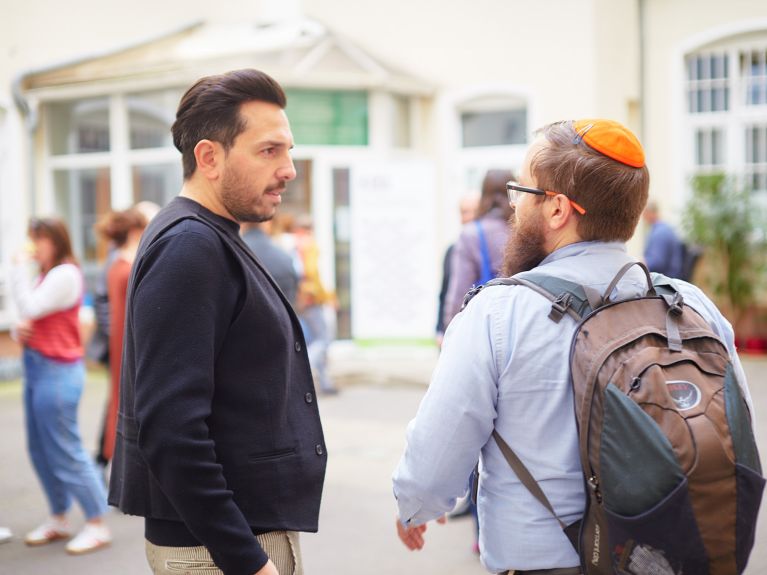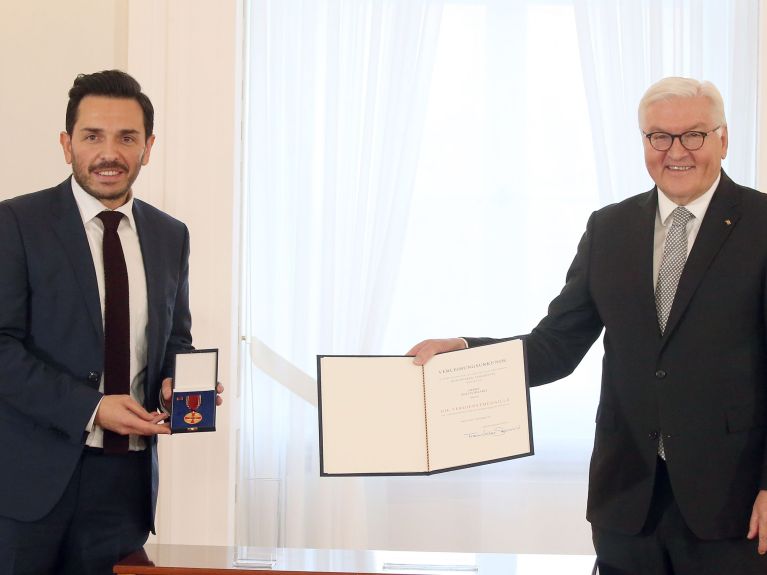“A differentiated view of the Middle East conflict”
Derviş Hizarcı is chair of the Kreuzberg Initiative Against Anti-Semitism (KIGA). His work also involves teaching people about the Middle East conflict.

Mr Hizarcı, you first got actively involved in combating anti-Semitism more than 20 years ago. What motivated you to do this as a young Muslim?
It was mainly a result of 11 September 2001. I was born and grew up in Berlin-Neukölln as the child of migrant workers. After 11 September, Muslims were typically equated with Islamist terrorists. The response to this was anti-Semitic conspiracy theories. When I started doing a degree in politics in Magdeburg, I had time to think and read. There was no single key event for me, but through reading, conversations with professors and my own reflection I began to realise that as a Muslim I suffer from generalisations about “Islam” and “the Muslims”, but I’m actually no different myself when it comes to Jews.
What followed on from this?
When I realised my own attitude was anti-Jewish, I was very shocked at myself. A phase of particularly intense religious devotion began around this time in my life as well. I started to actively practise Islam, praying five times a day and all the rest of it. This precluded any kind of misanthropy. As a result, I began to actively engage with anti-Semitism. Looking back, I realise that my own personal development has helped me in my work. I know how easy it is to be anti-Semitic – I’m familiar with the patterns and the social dynamics that fuel it.

KIGA was founded in 2003: you’ve been with the organisation for 14 years and have been chair of the board since 2015. What exactly does KIGA offer?
We hold strategy meetings with politicians and administrations, and we advise ministers, senators, members of parliament and senior ministerial officials on anti-Semitism, racism, hatred and intolerance. After the Hamas attack on Israel on 7 October 2023 in particular, there was a huge need for advice on how to deal with anti-Semitism and the Middle East conflict. But our core activities involve working with young people and training teachers and multipliers. Our exhibition “L’Chaim” provides people with information about the diversity of Jewish life in Berlin. In the travelling exhibition “ToleranzRäume”, we discuss issues of tolerance in numerous German cities. We’ve also established the European Network for Countering Anti-Semitism through Education, or Encate for short – a European network dedicated to combating anti-Semitism. The aim here is to join forces across national borders, sharing ideas and learning from each other.
Dieses YouTube-Video kann in einem neuen Tab abgespielt werden
YouTube öffnenThird party content
We use YouTube to embed content that may collect data about your activity. Please review the details and accept the service to see this content.
Open consent formHow does KIGA work with young people?
Before starting the actual work, it’s important to analyse the specific situation in which the conflict is taking place – in the case of anti-Semitic incidents at schools, for example. So when we receive a request, we start by holding preliminary discussions and developing a schedule. KIGA is about political education that is critical of anti-Semitism – so it’s not something that happens from one day to the next. Working with children and young people takes time, you have to build a relationship first, that’s vital – it’s the starting point for sound pedagogy, as I see it.
How are the workshops organised?
First of all, the aim is to give young people the space to communicate and also to express misguided beliefs, though without disqualifying them. After this, we get into the subject matter itself, which we adapt to the individual circumstances. Reading the “Diary of Anne Frank” or visiting a memorial site is not always the most suitable response to anti-Semitism. But you can learn to identify anti-Semitism. We have methods that enable people to take a differentiated view of the Middle East conflict, breaking down the black-and-white mindset.
We can open up new perspectives and promote mutual understanding.
How does KIGA achieve this?
We discuss how individual groups perceive certain historical events, for example. Then we look at how certain events are a cause for joy for some people but a cause for sadness for others. We provide information in a completely objective manner; after all, we’re not a lobby organisation for any one group, nor are we ideologically oriented. We’re interested in political education, and that includes highlighting controversy. Understanding the Middle East conflict requires an objective approach. We can provide information about the conflict and help people develop a political stance or even get actively involved themselves. This requires a certain degree of humility of course: we have to be aware that we won’t be able to solve the Middle East conflict from here. But we can open up new perspectives and promote mutual understanding. This at least has the effect of de-escalating tensions: ideally dialogue can take place and resilient relationships can develop.


